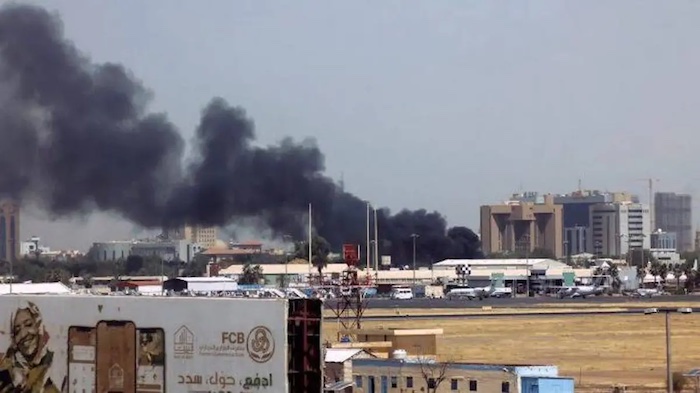Saturday, as Sudan entered its third week of fighting between rival military forces despite a ceasefire, Khartoum was rocked by airstrikes and artillery fire, causing more civilians to flee and prompting renewed warnings of broader instability if the war is not stopped.
As thick smoke rose over Khartoum, a U.N. envoy offered a glimmer of optimism, stating that the warring parties, who had previously shown no sign of compromise, were now more amenable to negotiations, although no date had been set.
Since April 15, when a long-simmering power struggle between the Sudanese army and the paramilitary Rapid Support Forces (RSF) erupted into conflict, hundreds of people have been slain and thousands wounded.
Despite early morning shelling, residents of Khartoum and its neighbouring cities reported less intense combat on Saturday than in recent days.
The battling has pushed Sudan towards a civil war that has derailed a transition to democratic elections supported by the international community and could destabilise an unstable region.
During a series of ceasefires mediated by foreign powers, most notably the United States, the combatants have continued to engage in armed conflict. The latest 72-hour ceasefire expires on Sunday at midnight.
Saturday, the RSF accused the army of violating the armistice in territories it controls.
The army, which has previously accused the RSF for violations and stated on Saturday that its forces were continuing to work to end “the rebellion,” did not comment immediately.
The prospects for negotiations between the two parties’ leaders have thus far appeared bleak.
General Abdel Fattah al-Burhan stated on Friday that he would never sit down with the “rebel” leader of the RSF, alluding to General Mohamed Hamdan Dagalo, also known as Hemedti. The RSF chief responded that he would not speak until the army ceased hostilities.
In spite of this, Volker Perthes, the U.N.’s special representative in Sudan, told Reuters that he had recently detected a change in the parties’ attitudes and that they were more amenable to negotiations.
“The word ‘negotiations’ or ‘discussions’ was absent from their conversation for the first week or so,” Perthes noted.
Perthes stated that the parties had nominated representatives for proposed discussions in Jeddah, Saudi Arabia, or Juba, South Sudan, but that there was a practical question as to whether they could “actually sit together” there.
Perthes stated that the immediate task was to devise a mechanism for monitoring ceasefires.
Perthes remarked that he had informed the Security Council that both parties believed they could win the conflict, but he added that attitudes were shifting. While each side had stated that the other must “surrender or die,” Perthes noted that they were also saying, “Okay, we accept… some form of negotiations.”
Both parties have acknowledged that this war cannot endure.
The Sudanese health ministry told Al Jazeera that at least 528 people have been murdered and 4,599 have been wounded, slightly more than the United Nations’ estimate, which is significantly higher. The United Nations reported that more than 75,000 people were displaced by the violence.
Former Sudanese Prime Minister Abdalla Hamdok, speaking at a conference in Nairobi, called for an end to the conflict and warned of its regional repercussions.
“This is a vast, diversified country… I believe it will be a global catastrophe,” he said.
This is not a conflict between a large army and a tiny rebel force. It is almost as if there are two armies: well-trained and well-equipped.”
Tens of thousands of individuals have fled to neighbouring nations, and foreign governments have orchestrated a massive evacuation of expatriates. The Saudi state broadcaster Alekhbaiya reported that a passenger ship carrying 1,982 individuals from 17 countries will arrive at the port of Jeddah on Saturday, and that nearly 5,000 had already arrived.
Britain has announced that its evacuations will cease on Saturday as demand for airline seats has decreased.
The majority of the combat has occurred in the capital Khartoum, where RSF fighters are entrenched in residential areas and many residents are surrounded by urban warfare with limited access to water, food, fuel, and electricity.
The violence has also reignited a two-decade-old conflict in western Darfur, where dozens of people have perished this week.
Zamzam Adam, a 23-year-old pregnant woman, stated that she was isolated, in labour, and alone when armed militias attacked and pillaged her village near the town of El Geneina in western Darfur and her neighbours fled to Chad.
Adam stated, “In our village, armed individuals burned and pillaged homes, forcing us to flee.”
Since Monday, at least 96 people have perished in Darfur as a result of the conflict between the army and the RSF, according to Ravina Shamdasani, spokesperson for the United Nations office for human rights.
